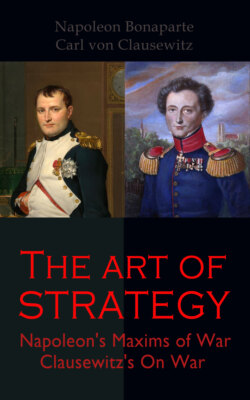Читать книгу The Art of Strategy: Napoleon's Maxims of War + Clausewitz's On War - Carl von Clausewitz - Страница 42
На сайте Литреса книга снята с продажи.
ОглавлениеMAXIM XXXVII.
Table of Contents
From the moment you are master of a position which commands the opposite bank, facilities are acquired for effecting the passage of the river; above all, if this position is sufficiently extensive to place upon it artillery in force. This advantage is diminished, if the river is more than three hundred toises (or six hundred yards) in breadth, because the distance being out of the range of grape, it is easy for the troops which defend the passage to line the bank and get under cover. Hence it follows that if the grenadiers, ordered to pass the river for the protection of the bridge, should reach the other side, they would be destroyed by the fire of the enemy; because his batteries, placed at the distance of two hundred toises from the landing, are capable of a most destructive effect, although removed above five hundred toises from the batteries of the crossing force. Thus the advantage of the artillery would be exclusively his. For the same reason, the passage is impracticable, unless you succeed in surprising the enemy, and are protected by an intermediate island, or, unless you are able to take advantage of an angle in the river, to establish a crossfire upon his works. In this case, the island or angle forms a natural tête de pont, and gives the advantage in artillery to the attacking army.
When a river is less than sixty toises (or one hundred and twenty yards) in breadth, and you have a post upon the other side, the troops which are thrown across derive such advantages from the protection of your artillery, that, however small the angle may be, it is impossible for the enemy to prevent the establishment of a bridge. In this case, the most skilful generals, when they have discovered the project of their adversary, and brought their own army to the point of crossing, usually content themselves with opposing the passage of the bridge, by forming a semicircle round its extremity, as round the opening of a defile, and removing to the distance of three or four hundred toises from the fire of the opposite side.
NOTE.
Frederick observes, that “the passage of great rivers in the presence of the enemy is one of the most delicate operations in war.” Success on these occasions depends on secrecy, on the rapidity of the manœuvres, and the punctual execution of the orders given for the movements of each division. To pass such an obstacle in presence of an enemy, and without his knowledge, it is necessary not only that the previous dispositions should be well conceived, but that they should be executed without confusion.
In the campaign of 1705, Prince Eugene, of Savoy, wishing to come to the assistance of the Prince of Piedmont, sought for a favorable point at which to force the passage of the Adda, defended at that time by the French army, under the command of the Duke de Vendome.
After having selected an advantageous situation, Prince Eugene erected a battery of twenty pieces of cannon on a position which commanded the entire of the opposite bank, and covered his infantry by a line of entrenched parallels constructed on the slope of the declivity.
They were working vigorously at the bridge, when the Duke de Vendome appeared with his whole army. At first he seemed determined to oppose its construction, but after having examined the position of Prince Eugene, he judged this to be impracticable.
He therefore placed his army out of reach of the prince’s batteries, resting both his wings upon the river, so as to form a bow, of which the Adda was the cord. He then covered himself with entrenchments and abattis, and was thus enabled to charge the enemy’s columns whenever they debouched from the bridge, and to beat them in detail.
Eugene, having reconnoitred the position of the French, considered the passage impossible. He therefore withdrew the bridge, and broke up his camp during the night.
It was by this manœuvre, also, that, in the campaign of 1809, the Archduke Charles compelled the French to reoccupy the isle of Lobau, after having debouched on the left bank of the Danube. The march of the Archduke Charles was wholly concentric. He menaced Grosaspern with his right, Esling with his centre, and Enzersdorf with his left.
His army, with both wings resting on the Danube, formed a semicircle around Esling. Napoleon immediately attacked and broke the centre of the Austrians; but after having forced their first line, he found himself arrested by the reserves. In the meantime, the bridges upon the Danube had been destroyed, and several of his corps, with their parks of artillery, were still on the right bank. This disappointment, joined to the favorable position of the Austrians, decided Napoleon to re-enter the isle of Lobau, where he had previously constructed a line of field-works, so as to give it all the advantages of a well entrenched camp.
